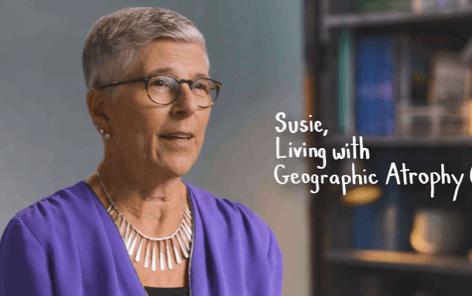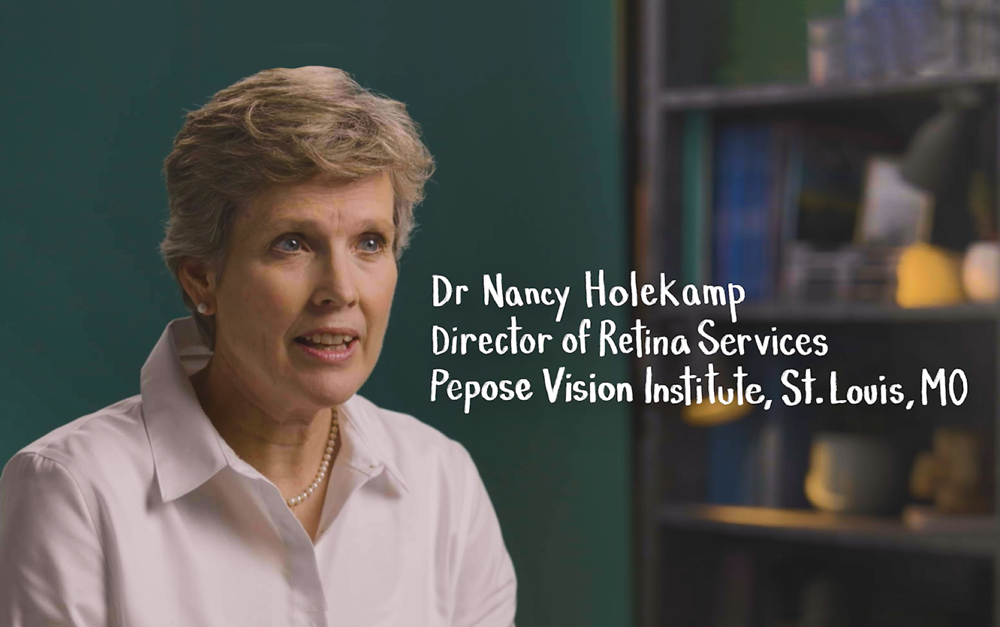Living with GA
If you’re struggling with vision changes and you’re thinking ‘I’m the only one.’ I‘m here to tell you that you are not alone.
— Henry Winkler
GA stories
Click on the video icons to hear from others living with or helping diagnose GA
Learn about GA from Retina Specialist, Dr Holekamp





View transcriptClose transcript
The following video was developed by Apellis Pharmaceuticals, and Dr Holekamp was compensated for her time. This video is not intended to include medical advice. You should consult your doctor with any questions or concerns you have about Geographic Atrophy (GA).
VO: My name is Nancy Holekamp, I am a retina specialist in St. Louis, Missouri, and today I'd like to talk to you about Geographic Atrophy, or GA.
When I speak to my patients about GA, I tell them it is a very advanced form of age-related macular degeneration and the most important risk factors are age and genetics, so family history matters, but other risk factors include diet and obesity.
To be clear, age and family history are the leading risk factors for GA, so you have to have both age and the genetics in order to get GA.
To explain GA, I often show patients their scan like the one you're seeing now. And here we see little accumulations of waste products called drusen that accumulate in the macula. The macula is just a fancy word for the center of the retina which is the center of your vision. In an eye with GA, the drusen are always growing closer to the center point of vision, which means the GA is always growing closer to the center point of vision.
So as the drusen grow and enlarge, then collapse into atrophy, they will form regions that you can actually draw a line around, almost like a geographic area or a map, and that's why we call it Geographic Atrophy.
Atrophy means cell death, so the cells in your retina are slowly dying. Early on you may not notice any change in your vision, but as it progresses it will eventually affect your central vision. Please keep in mind that while you may never lose peripheral vision, GA does cause irreversible vision impairment.
What you're seeing on the screen right now is an example of a scotoma or a blind spot that will affect your vision over time. But this is just an example; each person experiences GA differently.
While your central vision may be impacted, you should always maintain the ability to move around and take care of basic needs.
However, you may need to make significant life changes and ultimately depend on others for things such as driving. Getting a proper diagnosis of GA is very important. A diagnosis leads to prognosis, which helps you understand how this disease will affect you over time.
Science is learning more and more all the time about GA, and we are becoming more knowledgeable about this disease.
If you have vision symptoms, be sure to call your eye doctor who may refer you to a retina specialist. Seeing a doctor is critical.
How to talk about GA
Talking to your eye doctor and family about GA is important. Here are some tips to start the conversation.
Be aware
Keep track of vision changes. For example, make note if you start to have trouble driving at night or need more light when reading.
For an easy way to help track vision at home, get the Amsler Grid
View the Amsler GridTell the whole story
Talk about how vision changes are impacting your life and ask about available resources to help.
Be open and communicate
If you have been diagnosed with AMD or GA, changes in your vision can mean that your condition is getting worse. Talking to your eye doctor can help them to better monitor your disease.
The Doctor Discussion Guide can help you organize your thoughts and prepare for the next visit with your eye doctor
View the Doctor Discussion GuideKnow yourself
Vision changes can make many daily tasks harder or even unsafe. Take time to talk to loved ones about things that are becoming difficult and come up with a safe plan for moving forward together.
Bring them along
Just as vision changes may leave you feeling nervous or anxious, your loved ones may be experiencing similar emotions. It can help to attend eye doctor appointments together, so you can both ask questions and hear important answers.
If your loved one is experiencing vision changes:
Talk to them
Communicate with your loved one about their vision. If they are experiencing changes in vision, having trouble with daily tasks like driving at night or reading, or even tripping and falling more often, it’s important to encourage them to talk to their doctor.
For an easy way to help track vision at home, download the Amsler Grid
View the Amsler GridCheck in on their well-being
Changes in vision can be frustrating because people may feel like they’re losing independence. As their disease progresses, they may have trouble with daily tasks or recognizing faces. Let them know that you are there to support them through every step of their journey with GA.
Explore tips to help you and your loved one with emotional health
Be patient
Your loved one may need to rely on you to describe things they cannot see properly or read. They may also need you to help with daily tasks as their GA progresses. Keep reading to explore some ways you and your loved one can make home life easier and safer.
Life at home with GA
Daily tasks can become more difficult as Geographic Atrophy (GA) progresses and vision changes.
Fortunately, there are many ways to change your living space to help you adapt to living with GA.
Lighting
The overall lighting in your home should be bright and consistent throughout.
Here are some of the ways to help achieve this:
Technology
Many electronic devices have accessibility features that can make them easier to use as your vision changes.
These include:
Other ways to make living at home more comfortable
Simple changes to your home can make a huge difference. Consider making some of these changes below to help you find what you need more easily:
You’ve got to keep your cup not only half full, but three quarters full to fill some of their cup and keep their spirits up. — Henry Winkler on caring for your loved ones
Taking care of you and your eyes
Taking care of your emotional health is an important part of learning to adapt to life as your vision continues to change.
When you’re dealing with vision changes, it’s normal to feel anxious and fearful about what the future may hold. Relaxation methods like breathing exercises and meditation can control your body’s anxiety response and help you think more clearly.
You are not alone.
In a global Geographic Atrophy Insights Survey (GAINS) (N=203), conducted by The Harris Poll and sponsored by Apellis Pharmaceuticals,
46% of people felt anxious about their diagnosis
82% felt fearful about their future
Eye-friendly foods
According to American Macular Degeneration Foundation, following a Mediterranean-style diet with healthy ingredients can be beneficial for your overall eye health. Eating the following foods can help:
-

Salmon
-

Dark leafy greens
-

Corn
-

Blueberries
-

Peppers
